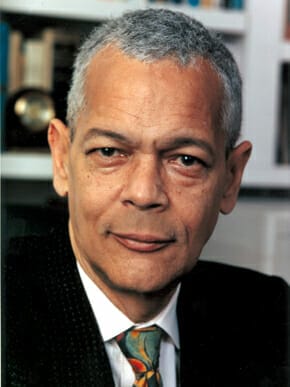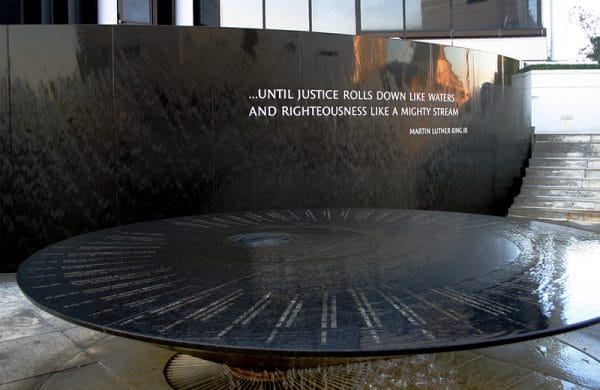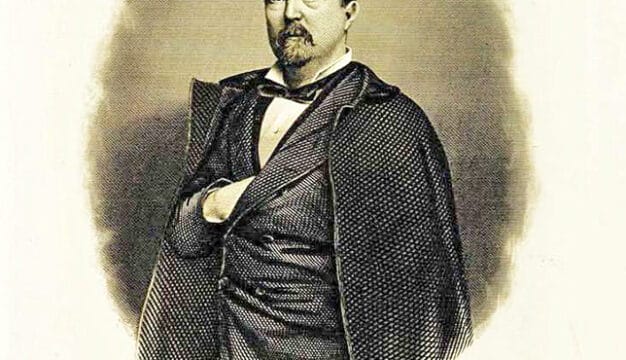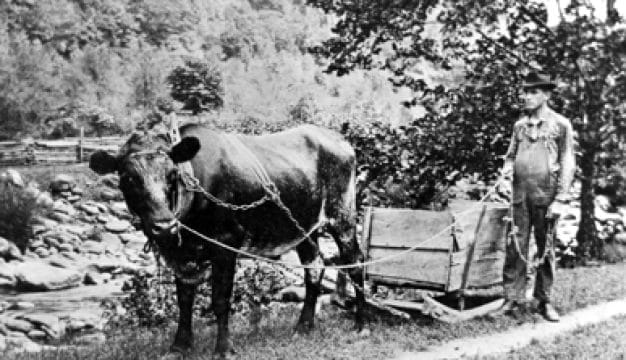Southern Poverty Law Center
The Southern Poverty Law Center (SPLC) is a non-profit organization based in Montgomery that works to end hate crime through both legal action and public education. SPLC was founded in 1971 by Morris Dees and Joe Levin, two young entrepreneurs turned civil-rights lawyers. Georgia legislator and civil-rights activist Julian Bond joined them soon after and served as president of the board from 1971–79. Bond remained active in the leadership of the organization until his death in 2015.
 Southern Poverty Law Center
Early on, the SPLC staff took on what had become abandoned liberal causes in the Deep South. They successfully argued cases enabling new civil-rights legislation to be implemented, challenging segregation of the YMCA (Smith v. YMCA, 1969), the state police (Paradise v. Allen, 1972), and unfairly drawn electoral districts (Nixon v. Brewer, 1972), as well as the practice of eugenics (Relf v. Weinberger, 1973). Advocacy on behalf of women in the workplace and welfare recipients also resulted in landmark decisions. During this time, the organization also focused on the racially unbalanced death-row populations in U.S. prisons. SPLC provided legal representation in individual cases of poor black defendants who had not had the benefit of adequate counsel in their original trials. SPLC lawyers argued successfully before the U.S. Supreme Court that Alabama’s laws regarding the death penalty were unconstitutional and won the freedom of 11 inmates in 1980.
Southern Poverty Law Center
Early on, the SPLC staff took on what had become abandoned liberal causes in the Deep South. They successfully argued cases enabling new civil-rights legislation to be implemented, challenging segregation of the YMCA (Smith v. YMCA, 1969), the state police (Paradise v. Allen, 1972), and unfairly drawn electoral districts (Nixon v. Brewer, 1972), as well as the practice of eugenics (Relf v. Weinberger, 1973). Advocacy on behalf of women in the workplace and welfare recipients also resulted in landmark decisions. During this time, the organization also focused on the racially unbalanced death-row populations in U.S. prisons. SPLC provided legal representation in individual cases of poor black defendants who had not had the benefit of adequate counsel in their original trials. SPLC lawyers argued successfully before the U.S. Supreme Court that Alabama’s laws regarding the death penalty were unconstitutional and won the freedom of 11 inmates in 1980.
The organization truly raised its public profile and institutional momentum with litigation, spearheaded by the charismatic Dees, aimed at breaking up the Ku Klux Klan. In 1979, Klansmen attacked a peaceful civil-rights march in Decatur, Morgan County. The SPLC filed a protracted, though finally successful, suit against the perpetrators (Invisible Empire of the KKK) that resulted not only
 Morris Dees and Joe Levin
in punitive damages, community service, and enforced participation in race-relations education courses for the defendants, but also the cessation of all their hate-based activities. As the SPLC continued to pursue the Klan, they developed a simple strategy—win huge civil settlements that would leave targeted hate groups in financial ruin. For example, in 2000 Dees and the SPLC won a $6.3 million settlement, believed to be the largest punitive damage award in Idaho history, against Richard Butler, the head of the Aryan Nation. The group was bankrupted and forced to sell off its property. In a stroke of irony, the plaintiffs, a mother and son who had been shot at and harassed by Aryan Nation members, bought and occupied the property of the group that had once brutally harassed them. In another landmark victory, SPLC won a $7 million decision in 1987 against the United Klans of America in favor of Beulah Mae Donald, whose son was lynched by two Klansman in 1981. Donald was also awarded the Tuscaloosa headquarters of the group, which was bankrupted by the lawsuit. Dees still serves as the leading strategist and prosecutor in SPLC’s continuing legal crusade against the Klan and other hate groups. SPLC legal staff select cases that are likely to garner significant media attention.
Morris Dees and Joe Levin
in punitive damages, community service, and enforced participation in race-relations education courses for the defendants, but also the cessation of all their hate-based activities. As the SPLC continued to pursue the Klan, they developed a simple strategy—win huge civil settlements that would leave targeted hate groups in financial ruin. For example, in 2000 Dees and the SPLC won a $6.3 million settlement, believed to be the largest punitive damage award in Idaho history, against Richard Butler, the head of the Aryan Nation. The group was bankrupted and forced to sell off its property. In a stroke of irony, the plaintiffs, a mother and son who had been shot at and harassed by Aryan Nation members, bought and occupied the property of the group that had once brutally harassed them. In another landmark victory, SPLC won a $7 million decision in 1987 against the United Klans of America in favor of Beulah Mae Donald, whose son was lynched by two Klansman in 1981. Donald was also awarded the Tuscaloosa headquarters of the group, which was bankrupted by the lawsuit. Dees still serves as the leading strategist and prosecutor in SPLC’s continuing legal crusade against the Klan and other hate groups. SPLC legal staff select cases that are likely to garner significant media attention.
 Julian Bond
In addition to litigation, SPLC focuses on gathering information on hate groups, under the auspices of its Intelligence Project, through monitoring and publicizing the growth and activities of these groups throughout the nation. The project began in 1981 as Klanwatch, which aimed to gather information on the actions of this group and bring them to public light. More recently the center began monitoring hate crimes against immigrants through its Immigrant Watch program. The SPLC publishes an updated listing of hate and militia groups on its Web site as well as documented incidents of hate crimes against minority groups. The quarterly journal Intelligence Report is posted on the SPLC Web site, distributed to donors, and sent free of charge to schools, media, law-enforcement offices, and human-relations organizations. The large, diverse staff is composed of lawyers, paralegals, educators and interns who focus on researching all types of hate-group activity, preparing litigation, and disseminating information. Over the years they have acquired a high degree of credibility as a source of reliable information. SPLC spokespersons continue to be quoted in the media and consulted by government officials.
Julian Bond
In addition to litigation, SPLC focuses on gathering information on hate groups, under the auspices of its Intelligence Project, through monitoring and publicizing the growth and activities of these groups throughout the nation. The project began in 1981 as Klanwatch, which aimed to gather information on the actions of this group and bring them to public light. More recently the center began monitoring hate crimes against immigrants through its Immigrant Watch program. The SPLC publishes an updated listing of hate and militia groups on its Web site as well as documented incidents of hate crimes against minority groups. The quarterly journal Intelligence Report is posted on the SPLC Web site, distributed to donors, and sent free of charge to schools, media, law-enforcement offices, and human-relations organizations. The large, diverse staff is composed of lawyers, paralegals, educators and interns who focus on researching all types of hate-group activity, preparing litigation, and disseminating information. Over the years they have acquired a high degree of credibility as a source of reliable information. SPLC spokespersons continue to be quoted in the media and consulted by government officials.
 Civil Rights Memorial
Education is a central focus of the SPLC, as well. In 1991, the organization introduced its Teaching Tolerance initiative, which aims to spread a message of tolerance to school children and help prevent the creation of hate groups in the first place. The program develops and distributes a variety of curricular resources, including Teaching Tolerance magazine, that focus on fostering tolerance. The initiative also offers small grants to educators from elementary to high school level. In 2001 the center established Tolerance.org, a Web site that serves as a clearinghouse for social activists. The name of the initiative was changed to Learning for Justice in February 2021 to reflect an expanded focus on social justice and an audience beyond classroom educators.
Civil Rights Memorial
Education is a central focus of the SPLC, as well. In 1991, the organization introduced its Teaching Tolerance initiative, which aims to spread a message of tolerance to school children and help prevent the creation of hate groups in the first place. The program develops and distributes a variety of curricular resources, including Teaching Tolerance magazine, that focus on fostering tolerance. The initiative also offers small grants to educators from elementary to high school level. In 2001 the center established Tolerance.org, a Web site that serves as a clearinghouse for social activists. The name of the initiative was changed to Learning for Justice in February 2021 to reflect an expanded focus on social justice and an audience beyond classroom educators.
The SPLC offices in Montgomery are an educational resource in themselves. In 1989, the center dedicated the Civil Rights Memorial—a dramatic black granite monument designed by artist Maya Lin, who also designed the Vietnam Veterans Memorial in Washington, D.C. The multi-piece work memorializes the martyrs of the civil rights movement and evokes the words and actions of Martin Luther King. In 2005, SPLC opened its Civil Rights Memorial Center, which houses exhibits about the martyrs, a theater, a classroom, and the “wall of tolerance,” upon which visitors can enter their names as a commitment to the cause of tolerance.
 Wall of Tolerance
The center’s reach has expanded in the twenty-first century to include satellite offices in Mississippi, Louisiana, Georgia, and Florida. The first satellite office was opened in Jackson, Mississippi, in 2005 to house the SPLC’s Youth Justice Project and now employs approximately seven full-time staff members and an attorney who also works with the center’s New Orleans project. Dubbed the School-to-Prison Reform Project, the New Orleans project is a national initiative focused on shifting the trend away from mass imprisonment by educating children facing challenges such as learning disabilities. The program employs six full-time staff members. SPLC’s Immigrant Justice Project, founded in 2004 in Montgomery, relocated to Atlanta in June 2009 and employs 19 full-time staff members. The SPLC also employs an attorney in Florida to press school districts statewide to provide for challenged and special-needs students—as required by federal guidelines—to combat the school-to-prison trend.
Wall of Tolerance
The center’s reach has expanded in the twenty-first century to include satellite offices in Mississippi, Louisiana, Georgia, and Florida. The first satellite office was opened in Jackson, Mississippi, in 2005 to house the SPLC’s Youth Justice Project and now employs approximately seven full-time staff members and an attorney who also works with the center’s New Orleans project. Dubbed the School-to-Prison Reform Project, the New Orleans project is a national initiative focused on shifting the trend away from mass imprisonment by educating children facing challenges such as learning disabilities. The program employs six full-time staff members. SPLC’s Immigrant Justice Project, founded in 2004 in Montgomery, relocated to Atlanta in June 2009 and employs 19 full-time staff members. The SPLC also employs an attorney in Florida to press school districts statewide to provide for challenged and special-needs students—as required by federal guidelines—to combat the school-to-prison trend.
 Richard Cohen
The work of the SPLC is not without its critics. Questions have been raised in local and national media about changes in SPLC’s fundraising tactics as it has grown to become “one of the most profitable charities in the country,” as noted in Harper’s magazine. Critics contend that efforts at marketing the organization for potential donors have taken the focus off the important work of the organization, such as its early efforts to fight the death penalty. The recent inclusion of the Nation of Islam as a hate group has also stirred controversy. At the center of this storm is the strong leadership of its co-founder Morris Dees, who is still listed as “Founder and Chief Trial Counsel.” Despite these critiques, since 1971 the SPLC has continued to effectively expose and attack organized hate groups and promote the lessons of tolerance to younger generations. In 2019, the SPLC fired co-founder Morris Dees but declined to give details for the action. President Richard Cohen left the organization soon after it removed Dees.
Richard Cohen
The work of the SPLC is not without its critics. Questions have been raised in local and national media about changes in SPLC’s fundraising tactics as it has grown to become “one of the most profitable charities in the country,” as noted in Harper’s magazine. Critics contend that efforts at marketing the organization for potential donors have taken the focus off the important work of the organization, such as its early efforts to fight the death penalty. The recent inclusion of the Nation of Islam as a hate group has also stirred controversy. At the center of this storm is the strong leadership of its co-founder Morris Dees, who is still listed as “Founder and Chief Trial Counsel.” Despite these critiques, since 1971 the SPLC has continued to effectively expose and attack organized hate groups and promote the lessons of tolerance to younger generations. In 2019, the SPLC fired co-founder Morris Dees but declined to give details for the action. President Richard Cohen left the organization soon after it removed Dees.
Further Reading
- Carrier, Jim. Ten Ways to Fight Hate: A Community Response Guide. Montgomery, Ala.: Southern Poverty Law Center, 2001.
- Dees, Morris, with Steve Fiffer. A Season for Justice: The Life and Times of Civil Rights Lawyer Morris Dees. New York: Charles Scribner’s Sons, 1991.
- Fleming, Maria, ed. A Place at the Table: Struggles for Equality in America. New York: Oxford University Press in association with the Southern Poverty Law Center, 2001.



